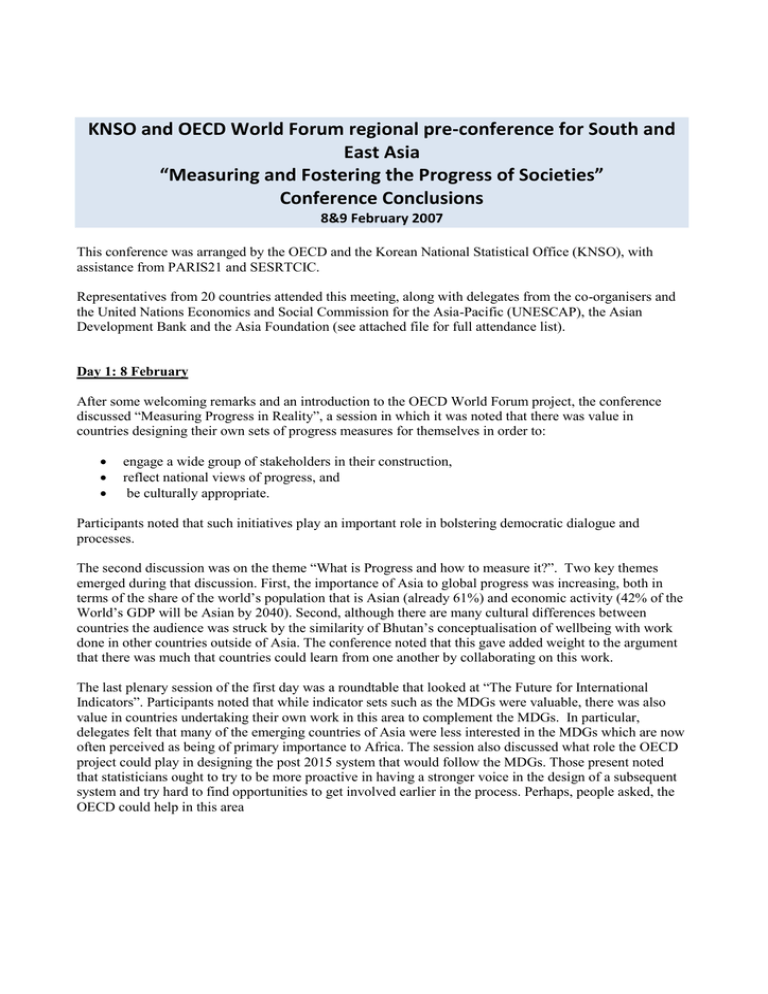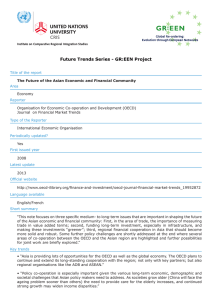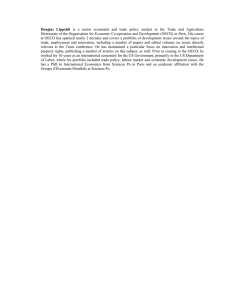KNSO and OECD World Forum regional pre-conference for South and
advertisement

KNSO and OECD World Forum regional pre-conference for South and East Asia “Measuring and Fostering the Progress of Societies” Conference Conclusions 8&9 February 2007 This conference was arranged by the OECD and the Korean National Statistical Office (KNSO), with assistance from PARIS21 and SESRTCIC. Representatives from 20 countries attended this meeting, along with delegates from the co-organisers and the United Nations Economics and Social Commission for the Asia-Pacific (UNESCAP), the Asian Development Bank and the Asia Foundation (see attached file for full attendance list). Day 1: 8 February After some welcoming remarks and an introduction to the OECD World Forum project, the conference discussed “Measuring Progress in Reality”, a session in which it was noted that there was value in countries designing their own sets of progress measures for themselves in order to: engage a wide group of stakeholders in their construction, reflect national views of progress, and be culturally appropriate. Participants noted that such initiatives play an important role in bolstering democratic dialogue and processes. The second discussion was on the theme “What is Progress and how to measure it?”. Two key themes emerged during that discussion. First, the importance of Asia to global progress was increasing, both in terms of the share of the world’s population that is Asian (already 61%) and economic activity (42% of the World’s GDP will be Asian by 2040). Second, although there are many cultural differences between countries the audience was struck by the similarity of Bhutan’s conceptualisation of wellbeing with work done in other countries outside of Asia. The conference noted that this gave added weight to the argument that there was much that countries could learn from one another by collaborating on this work. The last plenary session of the first day was a roundtable that looked at “The Future for International Indicators”. Participants noted that while indicator sets such as the MDGs were valuable, there was also value in countries undertaking their own work in this area to complement the MDGs. In particular, delegates felt that many of the emerging countries of Asia were less interested in the MDGs which are now often perceived as being of primary importance to Africa. The session also discussed what role the OECD project could play in designing the post 2015 system that would follow the MDGs. Those present noted that statisticians ought to try to be more proactive in having a stronger voice in the design of a subsequent system and try hard to find opportunities to get involved earlier in the process. Perhaps, people asked, the OECD could help in this area Day 2: 9 February The session “Measuring Progress: Bringing statistics, policy makers and society closer together” discussed ways in which statistics could be brought to the attention of a wider audience and in particular the need for policy makers and statisticians to develop a closer working relationship at all stage of the policy making process and statistical cycle. Several delegates noted that more attention needed to be paid to this aspect to ensure that statisticians could work more effectively and better decisions could be taken. The session “Building Statistical Capacity to Monitor the Progress of Societies” underlined the demands already placed on statistical offices to report indicators. Participants discussed how countries can build the capacity of their national statistical systems (central statistical office, line ministry statistical units, research centres, etc.) to respond to these national, regional, and international demands to track progress and outlined the support from organisations such as PARIS21 and UNESCAP to help build this capacity. The session on “Measuring Democracy and Human Rights” looked at the international program of work that METAGORA is undertaking in this area. Participants were particularly interested to hear about work underway in the Philippines that was deliberately and overtly aimed at holding individual politicians to account. Participants felt this underlined the role measuring progress work can have in helping with democratic dialogue in the run up to elections. The conference ended with a plenary session on “Turning Statistics into Knowledge and Knowledge into Policy”. Two speakers looked at the ways in which statistical indicators could be used to reach a new and wider audience and how to ensure that the users could be given something they would remember and understand. Particular emphasis was given to the role of ICT in this area. Participants noted the increasing importance of – and opportunities for – work in this area. Several people supported the role that the OECD’s World Forum Project could have in developing best practice in this area. Six parallel sessions during the conference looked at the importance of measuring progress work in gender, globalisation, demography, financial security, inequality and energy and the environment. Main conclusions There seemed to be strong support among those present for the development of national sets of progress measures. Many delegates noted that given the growing dominance of Asia in determining global progress it is vitally important that Asian progress and concerns are fully reflected in the OECD’s global project. Moreover, participants noted that sets of progress measures could strengthen the role and influence of NSOs by: Acting as a focal point for helping NSOs to refine their work program Provide an opportunity, through consultations on areas of progress and their indicators, to strengthen ties with policy makers, NGOs and the media Help to enable NSOs to reach a broad audience Strengthen the role of NSOs in providing analysis as well as simply publishing data Help to ensure that international sets of development measures reflected issues that were important and culturally appropriate to each country. Next Steps The OECD would invite all chief statisticians from Asia to attend the Istanbul Conference and would continue to approach some people with invitations to play a formal role, as well as seek suggestions for other Asian speakers. The OECD hoped that the 2009 World Forum could be arranged in Asia. Enrico Giovannini OECD Chief Statistician DaeYou Kim Commissioner, Korean National Statistics Office


